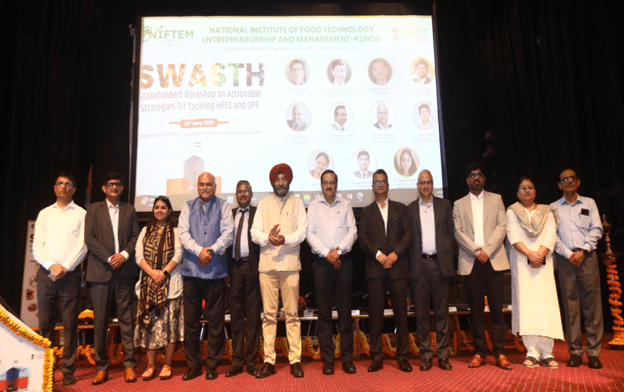MoFPI Secretary Discusses Technology-Driven Nutrition Tracking at SWASTH Workshop

The Ministry of Food Processing Industries (MoFPI) recently held a one-day workshop in collaboration with the National Institute of Food Technology Entrepreneurship and Management (NIFTEM-Kundli). Titled SWASTH (Stakeholders Workshop on Actionable Strategies for Tackling HFSS and UPF), the event focused on the theme “Shedding Light on Science, Consumption, and Choices in Modern Food.” Key speakers emphasized the importance of health and diet in today’s fast-paced world, highlighting the need for innovative solutions to address rising concerns over food quality and consumption habits.
Keynote Address Highlights Health Awareness
During the workshop, Dr. Subrata Gupta, Secretary of MoFPI, delivered a keynote address stressing the growing public awareness surrounding health and wellness. He noted that while many individuals track their physical activity using smart devices, they often neglect to monitor their caloric intake. To bridge this gap, Dr. Gupta proposed the development of a smartwatch-like device that could measure daily calorie consumption. He referenced alarming statistics from the World Health Organization (WHO) and the Medical Council of India (MCI), indicating that non-communicable diseases (NCDs) account for two-thirds of global deaths. Dr. Gupta also raised concerns about food adulteration and food wastage, urging collective action and innovation to tackle these pressing issues. He encouraged NIFTEM-K to host similar workshops regularly to foster ongoing dialogue.
Educational Initiatives and Traditional Wisdom
Dr. Harinder Singh Oberoi, Director of NIFTEM-K, announced plans to propose the inclusion of food processing chapters in NCERT textbooks. This initiative aims to instill healthy eating habits in children from an early age. He emphasized the importance of traditional Indian wisdom in nutrition, stating, “Food be the medicine,” and highlighted the collaboration between NIFTEM-K and the Food Safety and Standards Authority of India (FSSAI) to standardize methodologies for measuring added sugars in food products. This effort seeks to merge traditional knowledge with modern scientific approaches, ensuring that consumers are better informed about their food choices.
Dr. Ravinarayan Acharya, Director General of the Central Council for Research in Ayurvedic Sciences (CCRAS), shared insights on Ayurveda’s principles, emphasizing that food is considered medicine within this ancient practice. He reiterated that maintaining good health is the primary goal of Ayurveda, with treatment being secondary. Dr. Acharya also mentioned the Ministry of Ayush’s collaboration with FSSAI and other government bodies to ensure food safety and quality.
Addressing HFSS and UPF Concerns
The workshop included discussions on the risks associated with High in Fat, Salt, and Sugar (HFSS) and ultra-processed foods (UPFs). Dr. Satyen Panda, Executive Director of Research and Development at FSSAI, highlighted the prevalence of food adulteration and the need for a balanced approach to address these issues. In the first technical session, Dr. Priyanka Bansal from the Indian Council of Medical Research (ICMR) presented guidelines for addressing nutrient deficiencies, while Ashim Sanyal, CEO of Consumer VOICE, called for a clear definition of HFSS in the Indian context.
The second session featured discussions on the misconceptions surrounding processed foods. Dr. Komal Chauhan from NIFTEM-K argued against the blanket assumption that all processed foods are harmful, advocating for evidence-based discussions. Experts emphasized the importance of relying on India’s scientific institutions for research and urged for standardized portion sizes to guide consumers effectively.
Industry Perspectives and Future Directions
The third session focused on the food industry’s perspective, with representatives from major companies like ITC Ltd., Marico, and Nestlé India Ltd. sharing their views on HFSS and UPF. There was a consensus on the necessity for robust clinical trials and scientific evidence before implementing policies that could significantly impact public health. Industry representatives advocated for a serve size-based regulatory model and called for a comprehensive national nutrition survey to better understand dietary habits across India’s diverse population.
Participants emphasized the need for policies grounded in rational, evidence-based frameworks, highlighting that many nutritious foods could be misclassified as UPFs. The workshop concluded with a call for balanced awareness, encouraging consumers to make informed choices without succumbing to fear or confusion. The overarching message was to “Eat consciously. Keep it simple,” to prevent NCDs through mindful eating practices. The event attracted over 80 in-person attendees and more than 100 virtual participants, showcasing a strong commitment to improving food safety and health awareness in India.
Observer Voice is the one stop site for National, International news, Sports, Editor’s Choice, Art/culture contents, Quotes and much more. We also cover historical contents. Historical contents includes World History, Indian History, and what happened today. The website also covers Entertainment across the India and World.

